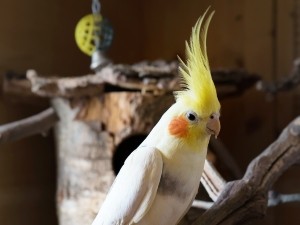
If baby cockatiels are well fed these birds will grow fast, in fact, it’s amazing how fast these baby birds grow.
But how do you know when to feed these birds? This article looks into how to know if your baby cockatiel is hungry.
Table of Contents
How to know if your baby cockatiel is hungry:
Watching a baby cockatiel grow in front of your eyes is quite amazing and this growth is possible through good feeding.
Feeding the bird regularly is a must, here is how to tell that your baby cockatiel is hungry:
Making loud noises:
Any bird, who is trying to get attention, will start to make loud noises.
These loud noises are meant to get your attention, or, get the attention of their mother.
Making loud noises is one way that these little birds communicate that they are hungry and that they want you to feed them
The bird will make squawking, crying, chirping, and screeching noises when they are hungry.
All these sounds are ways that the bird will beg for food, and this begging may be quite intense.
Opening their mouths:
Baby birds will open their mouth as a way of communicating that they want to be fed.
The hungry bird will stretch and open its mouth quite widely and this may actually look quite uncomfortable.
Visiting the feed bowl:
If your young bird is old enough to reach its feed bowl on its own then the hungry bird will walk over to the feed bowl looking for food often.
If there is no feed in the feed bowl then the bird will continue walking to the feed bowl in hopes of food appearing
Nibbling on things:
If your bird doesn’t have access to any food it will go around the cage and will try to nibble at objects in the cage.
The bird is simply trying to eat anything it can find at this point, even if it can’t find any food to eat.
If there is nothing else to eat, then your baby cockatiel may try to nibble on its chew toys, on shredded newspapers, or, on the bedding in its cage
Guarding the food bowl:
If your bird is especially hungry, and there are other birds in the cage, then the bird will start to become territorial over the food bowl.
The bird will make sure that no other birds can get to the food bowl in case food appears.
Aggressive movements:
A hungry baby cockatiel will move a lot when hungry and this may affect its siblings.
If your baby cockatiel is being raised with other birds, then the hungry bird may even push its siblings around as it tries to move toward the food sources and food bowls.
If you enjoyed this article then you may also be interested in other bird related articles. Here are some articles that you may be interested in: Why Is My Budgie Always Tired?, My Budgie Just Sits There, Chicken Throwing Up Green Liquid, Why Is My Chicken Gulping?, Cockatiel Not Eating And Sleeping, Baby Cockatiel Not Eating Formula, Can You Overfeed A Baby Cockatiel?

